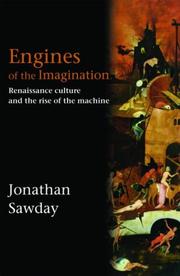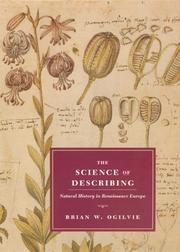| Listing 1 - 4 of 4 |
Sort by
|

ISBN: 9780415350624 041535062X 0415350611 0203696158 9780415350617 9780203696156 9781134267880 9781134267927 9781134267934 Year: 2007 Publisher: London: Routledge,
Abstract | Keywords | Export | Availability | Bookmark
 Loading...
Loading...Choose an application
- Reference Manager
- EndNote
- RefWorks (Direct export to RefWorks)
Engineering sciences. Technology
---
History of civilization
---
anno 1600-1699
---
anno 1400-1499
---
anno 1500-1599
---
Machinery
---
History
---
930.85.44
---
Cultuurgeschiedenis: Renaissance
---
Maschine
---
Maschine.
---
Motiv (Literatur)
---
Technik
Book
ISBN: 9781409400240 9781409423997 1409400247 1409423999 1317066391 9786612892752 1315605317 1282892754 9781315605319 9781317066385 9781317066392 9781138245488 Year: 2010 Volume: *22 Publisher: Aldershot: Ashgate,
Abstract | Keywords | Export | Availability | Bookmark
 Loading...
Loading...Choose an application
- Reference Manager
- EndNote
- RefWorks (Direct export to RefWorks)
How are processes of vision, perception, and sensation conceived in the Renaissance? How are those conceptions made manifest in the arts? The essays in this volume address these and similar questions to establish important theoretical and philosophical bases for artistic production in the Renaissance and beyond. The essays also attend to the views of historically significant writers from the ancient classical period to the eighteenth century, including Plato, Aristotle, Plotinus, St Augustine, Ibn Sina (Avicenna), Ibn al-Haytham (Alhazen), Ibn Sahl, Marsilio Ficino, Nicholas of Cusa, Leon Battista Alberti, Gian Paolo Lomazzo, Gregorio Comanini, John Davies, Rene Descartes, Samuel van Hoogstraten, and George Berkeley.
History --- Renaissance --- Aesthetics --- Christian special devotions --- art theory --- Affective and dynamic functions --- Art --- Descartes, René --- anno 1400-1499 --- anno 1500-1599 --- Visual perception --- Vision --- Perspective --- Art, Renaissance. --- Perception visuelle --- Art de la Renaissance --- History. --- Philosophy. --- Histoire --- Philosophie --- Art, Renaissance --- Philosophy --- Geschichte 1420-1600. --- Art -- Philosophy. --- Perspective -- History. --- Visual perception -- History. --- Visual Arts --- Art, Architecture & Applied Arts --- Visual Arts - General --- Visual perception - History --- Vision - History --- Perspective - History --- Art - Philosophy
Book
ISBN: 9781935408024 9781942130345 1942130341 193540802X Year: 2012 Publisher: New York: Zone books,
Abstract | Keywords | Export | Availability | Bookmark
 Loading...
Loading...Choose an application
- Reference Manager
- EndNote
- RefWorks (Direct export to RefWorks)
A reconsideration of the problem of time in the Renaissance, examining the complex and layered temporalities of Renaissance images and artifacts. In this widely anticipated book, two leading contemporary art historians offer a subtle and profound reconsideration of the problem of time in the Renaissance. Alexander Nagel and Christopher Wood examine the meanings, uses, and effects of chronologies, models of temporality, and notions of originality and repetition in Renaissance images and artifacts. Anachronic Renaissance reveals a web of paths traveled by works and artists―a landscape obscured by art history's disciplinary compulsion to anchor its data securely in time. The buildings, paintings, drawings, prints, sculptures, and medals discussed were shaped by concerns about authenticity, about reference to prestigious origins and precedents, and about the implications of transposition from one medium to another. Byzantine icons taken to be Early Christian antiquities, the acheiropoieton (or “image made without hands”), the activities of spoliation and citation, differing approaches to art restoration, legends about movable buildings, and forgeries and pastiches: all of these emerge as basic conceptual structures of Renaissance art. Although a work of art does bear witness to the moment of its fabrication, Nagel and Wood argue that it is equally important to understand its temporal instability: how it points away from that moment, backward to a remote ancestral origin, to a prior artifact or image, even to an origin outside of time, in divinity. This book is not the story about the Renaissance, nor is it just a story. It imagines the infrastructure of many possible stories
Art --- anno 500-1499 --- anno 1500-1599 --- Art, Renaissance. --- Architecture, Renaissance. --- Building materials --- Time and art. --- Recycling. --- Architecture, Renaissance --- Art, Renaissance --- Time and art --- Art and time --- Architectural materials --- Architecture --- Building --- Building supplies --- Buildings --- Construction materials --- Structural materials --- Materials --- Renaissance art --- Renaissance architecture --- Renaissance revival (Architecture) --- Recycling --- Renaissance --- Analyse de l'art --- kunst --- kunsttheorie --- 7.01 --- 7.034 --- renaissance --- tijdelijkheid --- tijd --- Geschichte 1420-1550. --- Geschichte 1420-1600. --- 1400-1500. --- 1500-1600. --- Art de la Renaissance --- Architecture de la Renaissance --- Construction --- Temps et art --- Matériaux --- Recyclage

ISBN: 128196610X 9786611966102 0226620867 9780226620862 9780226620879 0226620875 9781281966100 0226620875 6611966102 0226620883 9780226620886 Year: 2006 Publisher: Chicago : University of Chicago Press,
Abstract | Keywords | Export | Availability | Bookmark
 Loading...
Loading...Choose an application
- Reference Manager
- EndNote
- RefWorks (Direct export to RefWorks)
Out of the diverse traditions of medical humanism, classical philology, and natural philosophy, Renaissance naturalists created a new science devoted to discovering and describing plants and animals. Drawing on published natural histories, manuscript correspondence, garden plans, travelogues, watercolors, and drawings, The Science of Describing reconstructs the evolution of this discipline of description through four generations of naturalists. In the late fifteenth and early sixteenth centuries, naturalists focused on understanding ancient and medieval descriptions of the natural world, but by the mid-sixteenth century naturalists turned toward distinguishing and cataloguing new plant and animal species. To do so, they developed new techniques of observing and recording, created botanical gardens and herbaria, and exchanged correspondence and specimens within an international community. By the early seventeenth century, naturalists began the daunting task of sorting through the wealth of information they had accumulated, putting a new emphasis on taxonomy and classification. Illustrated with woodcuts, engravings, and photographs, The Science of Describing is the first broad interpretation of Renaissance natural history in more than a generation and will appeal widely to an interdisciplinary audience.
Science --- Natural history --- Science, Renaissance. --- Renaissance science --- History, Natural --- Natural science --- Physiophilosophy --- Biology --- Natural sciences --- Science of science --- Sciences --- History --- Science, Renaissance --- 094:58 --- 094:59 --- 094:59 Oude en merkwaardige drukken. Kostbare en zeldzame boeken. Preciosa en rariora-:-Zoologie. Dierkunde --- Oude en merkwaardige drukken. Kostbare en zeldzame boeken. Preciosa en rariora-:-Zoologie. Dierkunde --- 094:58 Oude en merkwaardige drukken. Kostbare en zeldzame boeken. Preciosa en rariora-:-Botany --- Oude en merkwaardige drukken. Kostbare en zeldzame boeken. Preciosa en rariora-:-Botany --- Pure sciences. Natural sciences (general) --- science [modern discipline] --- description [activity] --- 42.05 natural history. --- Beschreibung. --- Illustration. --- Kunst. --- Natur. --- Natural history. --- Naturbeobachtung. --- Naturgeschichte --- Natuurlijke historie. --- Renaissance. --- Science. --- Sciences de la Renaissance. --- Sciences naturelles --- Wissenschaft. --- Histoire --- 1500-1599. --- Geschichte 1420-1600. --- Geschichte 1500-1650. --- Europa --- Europa. --- Europe. --- Illustration --- Kunst --- Wissenschaft --- Science - Europe - History - 16th century. --- Natural history - Europe - History - 16th century. --- science, scientific, natural history, historical context, renaissance, europe, european, description, traditions, medical humanism, classical philosophy, philosophical, naturalists, naturalism, discovery, discovering, plants, animals, correspondence, garden plans, travelogues, watercolors, art, artwork, drawings, development, distinguishing, cataloging, characteristics, species, nature, taxonomy, classification, 16th century, interdisciplinary studies, common sense.
| Listing 1 - 4 of 4 |
Sort by
|

 Search
Search Feedback
Feedback About UniCat
About UniCat  Help
Help News
News